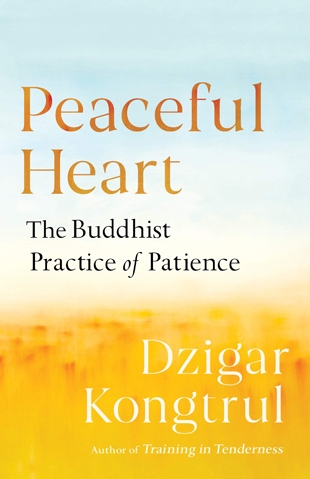"The practice of patience is not easy, but throughout history it has proven to be transformative by those who are open to its profound instructions and learn to follow them with confidence."
— Dzigar Kongtrul
Dzigar Kongtrul grew up in a monastic environment and received extensive training in all aspects of Buddhist doctrine. After moving to the United States in 1989, he taught Buddhist philosophy at Naropa University and founded Mangala Shri Bhuti, a Tibetan Buddhist teaching organization with branches around the world, and Longchen Jigme Samten Ling, a retreat center in southern Colorado. He is the author of Training in Tenderness and The Intelligent Heart.
In this substantive volume, Kongtrul uses the sixth chapter of Shantideva's The Way of the Bodhisattva on patience as a catalyst giving "a set of thorough instructions for maintaining this supremely peaceful heart in the face of every kind of challenge and threat." He notes that anger takes away the bounties of pleasure. He tells a story which reminds us of what happened to us if we had a fight while visiting Antigua, an island with some of the most beautiful beaches in the world. The turquoise blue of the ocean, the enticing white sand, our comfortable hotel room were all tainted when we had a fight, their beauty vanishing in a burst of anger.
The rest of the book explores the 24 categories of things that can feed our aggression. They can have their genesis in the past, the present and the future. Kongtrul states that the only way we can control our aggression is by studying its causes and then not indulging them. With admirable elegance, he discusses the art of training the mind to be strong and resilient, having the heart flow for the benefit of yourself and others, relying on meditation to undermine our habitual reactiveness, letting go of our emotional addictions, watching out that we do not turn friends, family, and neighbors into objects of our irritation and aggressiveness, relying on teachers and teachings for maps of inner peace, working with jealousy, not taking pleasure in other's pain, and coping with the disappointment of not getting what we want.
Kongtrul concludes with two appendices which give added value to this overview of peace and patience: Meditation on Patience and The Seventy-Two Ways We Get Disturbed.
